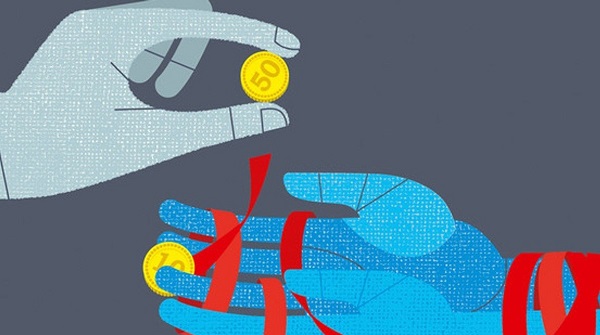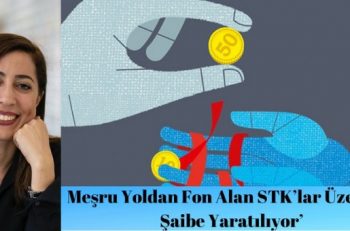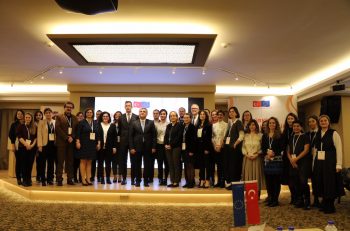Doubt is Casted on the Legitimately Funded NGOs’

Showing the use of funds by NGOs that try to continue their activities with limited resources in Turkey suspicious and illegal harms civil society. The Third Sector Foundation of Turkey (TÜSEV) warns that the misuse of funds should be prevented by the relevant authorities with a supportive approach to civil society and by taking the necessary precautions. On the other hand, activist-writer Nurcan Baysal sees the illegalization of funding as the continuation of intense pressure on civil society and a harbinger of worsening.
The debate, which started over the funding of some media outlets in Turkey by a US-based foundation, continues with accusatory statements against civil society. While it is shown that NGOs receive funds from foreign sources as ‘illegal or illegitimate’, it is ignored that the legislation in Turkey includes the obligation to notify the public authorities of the foreign source used and that the relevant public institutions operate the audit processes in practice.
The first actor to be included in the issue of foreign funding is undoubtedly the European Union (EU). The support provided to civil society by the European Union, which is the main actor in the funding sources of NGOs in Turkey, is among the priorities of the financial aid provided to Turkey by the EU. Faruk Kaymakcı, Deputy Minister of Foreign Affairs and Director for European Union Affairs, did not touch upon the discussions on funding in civil society, but emphasized the role of civil society in the EU accession process. ‘Our EU membership process started with the public; the acceleration and successful completion of the process will only be possible with the participation and guidance of our civil society.’ Kaymakçı noted that it is ‘very meaningful and valuable’ for civil society in Turkey to work together with non-governmental organizations of other European countries.
‘Labeling and casting doubt on institutions that receive funding from abroad without any proof may damage the reputation of many legitimately operating institutions.’
The only NGO that has made a statement regarding the funding discussions so far has been the Third Sector Foundation of Turkey (TÜSEV).
In the statement titled ‘About International Funds’ made by TÜSEV, the vital role of civil society in the development of democracy and the solution of social problems and the different sources of income it needs to fulfill this function are reminded. In the statement reiterating the structural problems of civil society; attention is drawn to the restrictive provisions of the Aid Collection Law, as well as the limited and diversified funding sources that NGOs have access to in Turkey, as well as the underdeveloped individual donation culture.
In this context, it is pointed out that it is inevitable for civil society to receive grants from domestic and foreign sources in order to maintain its function, and ‘The labeling of institutions that receive funding from abroad without any proof and casting a doubt may damage the reputation of many legitimately operating institutions’ warning is given. At the end of TÜSEV’s statement, it is stated that the public authority should prioritize an approach that supports the work of NGOs while taking precautions against misuse of funds.
‘The Ones Who Illegalize Funded NGOs Are the Ones Who Don’t Believe in Disinterested Support’
Writer Nurcan Baysal, who is one of the founders of Diyarbakır Political and Social Research Institute (DİSA) and currently works as the Middle East consultant of different international fund organizations and foundations, spoke to Civil Pages about the discussions, and drew attention to the foundations of the problematic mentality in the prejudice that non-governmental actors ‘operating at international level, and giving and receiving funds are involved in illegal activities’.
According to Nurcan Baysal, who says that civil society can protect its independence and civility by receiving funds from foreign organizations in line with its own goals and principles, the criterion is ‘the NGO receives funds in line with its own goals and principles and the funds are used accordingly’. In order for the claim that ‘foreign organizations impose their own agenda’ or ‘funding institution that comes with its own agenda’, it should be more involved in the operation, the structure of the relevant NGO and many other things beyond giving funds and have a say in those issues.
Baysal reminded that Turkey has very few resources for NGOs and unlike many countries, individual donors are also insufficient, and on the agenda of funders, she also points out that topics like ‘The most vital needs of Turkey today are peace, equality, democracy, justice, human rights issues’ are not mentioned much. Pointing out that corporate philanthropic supports transferred to civil society are mostly limited to foundations of large families such as Sabancı, Koç, Özyeğin, Eczacıbaşı, and holding foundations, Baysal emphasizes that under these circumstances, it is inevitable for civil society to seek foreign funding.
‘A fund organization from Turkey funds children’s NGOs in Ghana so that children in Ghana do not die; a Foundation comes from the USA, funds an NGO in Turkey so that multiculturalism continues and the heritage of the peoples of Anatolia live, so that the melodies of humanity are not lost.’
Saying that the phrase ‘nobody funds anyone without reason’ in Turkey reflects the perception in the society and that the funding person or institution is believed to have a purpose or interest in the background, Baysal notes that people with this approach cannot comprehend the basic motivations of activists and civil socialists:
‘What we call human is not just a species of creature that works and earns money for its own self-interest. Humans fight for the things they believe in, for the world they believe in. Humans, without personal interest, fight just for their dreams, to get one step closer to the world of their dreams, fund child poverty in a country they have never known and vaccinate millions of children in the farthest corner of Africa. A fund organization from Turkey funds children’s NGOs in Ghana so that children in Ghana do not die; a Foundation comes from the USA, funds an NGO in Turkey so that multiculturalism continues and the heritage of the peoples of Anatolia live, so that the melodies of humanity are not lost. Humanity is interconnected, and this bond leads us to the need to do something about what is happening in other worlds, in other countries. People who criminalize funding sources from abroad are those who don’t have those dreams we talked about and don’t believe they can support something without the benefit of people. They don’t believe it, because it’s an unbelievable situation for them anyway. Like the Osman Kavala issue. They keep asking why a man has done all these good deeds. Because according to them, there must be something underneath.’
The Survival of NGOs in Turkey Has Become a Challenge!
Nurcan Baysal, who sees the attempts to criminalize the funding of civil society in Turkey as a continuation of intense pressure on civil society for a long time, said that the Kavala, Gezi, Büyükada Cases with thousands of NGOs that were closed, and their assets confiscated with the State of Emergency Decrees in 2016-2017. It reminds us of the Law No. 7262 on the Prevention of Financing the Proliferation of Weapons of Mass Destruction.
Describing all these occasions as ‘creating a climate of fear and making it difficult for rights defenders and NGOs to work and breathe’, Baysal says, ‘Today, trying to establish a non-governmental organization in Turkey and try to maintain it has turned into a challenge in itself.’
Saying, ‘The government criminalizes the remaining handful of NGOs in this way and renders them incapable of working,’ Baysal warns, this process paves the way for a more severe law on civil society, as in Russia, and progresses towards the burial of civil society in Turkey. Lastly, Baysal underlines that in order to stop this trend, it is necessary to put up a collective struggle and to find ways to act together.
You can find the interview with Sunay Demircan titled ‘Funds Used in Compliance with Principles and Values Do Not Harm the Civility of NGOs’ here.






Bizi Takip Edin